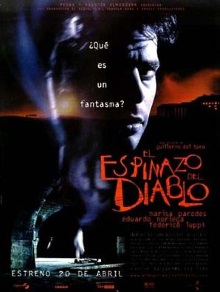
With The Devil’s Backbone off the list, I find that I have now watched every single feature film directed by Guillermo del Toro, with the exception of last year’s Crimson Peak which I skipped over due to its middling reviews. I don’t even consider him to be one of my favorite directors but he does have a talent for making films that can do well commercially and yet possess considerable artistic merit. The Devil’s Backbone makes for a good example of this: it’s a pretty standard ghost story without so much as an interesting twist in its favor, yet in del Toro’s hands it is elevated to the status of a classic due to the craftsmanship shown here and the director’s knack for visual storytelling.
Set during the tail end of the Spanish Civil War, the film shows us the point of a view of a young boy, Carlos. Unbeknownst to him, his father who fought on the side of the Republicans has died and he is brought to a small orphanage filled with other boys in similar straits. A huge un-exploded bomb dropped from a plane dominates the courtyard of the place and it is soon evident that a ghost haunts the halls. Though Carlos is initially bullied, he tries to fit in and eventually finds a place. Meanwhile the audience sees that each of the characters we see, from the headmistress who runs the place, the elderly doctor who serves as her assistant and the darkly handsome Jacinto who is the groundskeeper, have stories of their own going on.
Del Toro evokes the proper mood and atmosphere as only a true master can. Stains streak the walls of the orphanage like tears dripping down a face, the discolored pool of water in the cellar is a grim reminder of the jars of fetuses marinating in rum that the doctor keeps in his office, the cracked and pitted bomb stands in the courtyard like a Sword of Damocles even as the children regard it as a living thing with a ticking heart. The camerawork is superb as well. One of my favorite scenes is when the doctor, played by one of Del Toro’s favorite actors, Federico Luppi, dresses for work in the morning while reciting a poem while on the other side of the wall the headmistress silently smiles and appreciates the effort. Even the casting is great. A newcomer, Fernando Tielve, plays Carlos. His small frame reinforces the sense that he is but a child, yet there is something about his face that conveys how he is intelligent and has empathy well beyond his years.
Though the film isn’t about the Spanish Civil War, the setting both grounds it in a definite time and place while simultaneously giving it a measure of romanticism. I love the sense that all of the characters have lives of their own, with believable motivations and complex histories. There are no throwaway characters and even seemingly minor characters have their chance to shine. Del Toro apparently considers this to be his most personal film and you can certainly see how important this period is to him as his most celebrated film, Pan’s Labyrinth, is set amidst the same backdrop.
As with so many horror films the buildup is more enjoyable than the denouement and the moment when we learn the true story of what happened at the orphanage is also the point when it starts losing its luster. Fortunately Del Toro is smart enough to save this for the climax of the film and the ending while not being terribly novel is at least very satisfying. The more cerebral part of me feels like critiquing that not everything turns out to be relevant in the end and they never even explain what the mysterious pool of water in the basement is for. But then I remember the fantastic visuals, how finely tuned the atmosphere is and how creepy it all feels and I’m willing to forgive all of that.